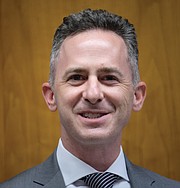Fewer, higher paid school liaisons would replace RPS’ 17 attendance officers under Kamras plan
Jeremy M. Lazarus | 3/22/2019, 6 a.m.
Jason Kamras is rejecting initial criticism of his plan to try a new approach to ensure Richmond students attend school daily.
Already endorsed by the Richmond School Board, the superintendent’s proposal is to dismantle the centralized attendance operation that currently employs 17 people and replace that with a much smaller group of school-based attendance liaisons.
Despite concern and warnings that his plan could result in more students skipping school, Mr. Kamras said he wants Richmond Public Schools to do more to resolve the family issues that lead more than 4,000 students a year — one in six of those enrolled — to miss 10 or more days of school.
In an interview with the Free Press Tuesday, he said, “We need to be more about solving the root causes of chronic absenteeism,” and he said that means changing the way RPS deals with the problem.
In Mr. Kamras’ view, RPS will make more progress by laying off the attendance officers and replacing them with seven higher-paid liaisons who each would be assigned to a middle or high school with a record of high chronic absenteeism. The schools would continue to have staff to report on daily attendance of each student.
Most schools, particularly elementary schools, would not have such an attendance specialist, he said.
Mr. Kamras sees his approach as narrower, but designed to go deeper into the problems that afflict families, with staff who know how to address those issues so that attendance won’t continue to be a problem.
Under current policy, attendance officers are detailed to make contact with families by phone or in person when a student misses five or more days of school, consecutive or not.
The officers each can handle 800 or 900 cases a year, including repeats, and most start each week with 20 or more files on students who have missed five days at some point.
Whether that school policy continues having staff get involved after a student is absent five days is a question. A change in the state attendance law approved by the Virginia General Assembly last year doubled the number of days, from five to 10, that a student can miss before the school must get involved.
RPS previously reported this year that 500 fewer students were missing classes, but it is not clear whether the total number would drop.
While Mr. Kamras praised the current officers as hard working and dedicated, most have graduated from high school and rely on “street smarts.” He envisions the new liaisons as college educated, with backgrounds in social work that he believes can help them delve deeper and better connect families and students with the services they need so students can stop skipping classes.
Mr. Kamras cited the hypothetical example of a 16-year-old who stops attending school because she has to stay home to care for younger siblings because the mother is ill and lacks access to medical care.
“What we want is the liaison to work with the family, with city social workers, with nonprofits and community groups to get the child care and help the family needs so the daughter can return to school,” he said. “We want the liaisons to resolve the underlying issues and put the family on a more sustainable path. That’s the vision.”
That includes connecting parents with the Office of Community Wealth Building to find employment opportunities, he said.
He said if each of the liaisons could reduce absenteeism for 250 students a year, RPS could begin to whittle down its truancy the numbers. His goal is to have no students missing school.
“We have a lot of agencies that work with families, but they may not be communicating very well,” he said. He sees liaisons being a central point of contact both for families and the litany of agencies that might have some involvement with them.
However, attendance officers insist that is the role they are playing now.
In testimony before the School Board and City Council, Butler Peterson, an 18-year veteran with RPS who has been an attendance officer since 2014, said the most important work he and his colleagues do is to establish rapport with the families and students they meet with and find out about the barriers they face to attendance.
He said it is routine to notify school social workers and counselors about the situation a student is facing or to call the family’s caseworker at the city Department of Social Services.
A significant portion of the students who miss school are part of homeless families who frequently are on the move and need a connection to resources, he said.
“We are involved in a lot more than just trying to get a student to go to school,” he said.
Mr. Kamras said he is committed to the school-based approach, but he acknowledges that there will be fewer staff focused on attendance.
“If it is working, we’ll invest more in it,” he said, indicating more liaisons would be hired. “If not, then we’ll change course.”








